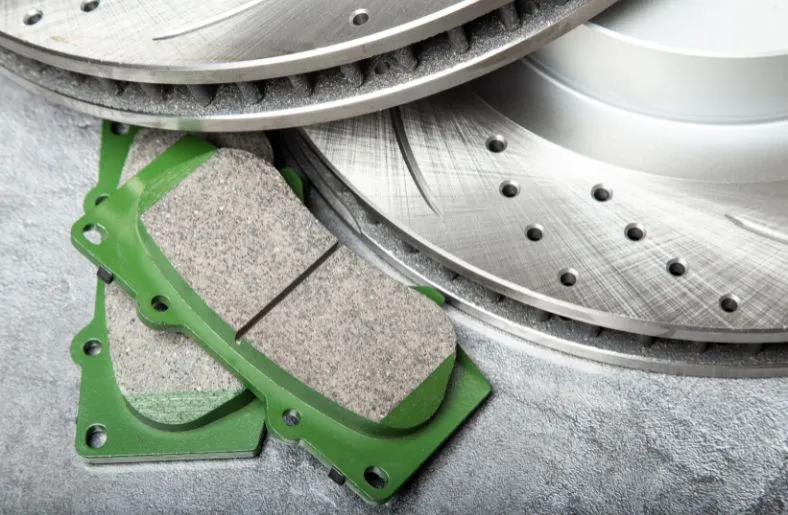Brake maintenance is a crucial aspect of vehicle safety, and one of the components often discussed in this context is brake pad grease. Some drivers swear by it, while others believe it’s an unnecessary addition to their brake maintenance routine.
In this blog, we will delve into the world of brake pad grease to answer the question: Is brake pad grease necessary?
Table of Contents
What are Brake Pads?
Before we can determine that is brake pad grease necessary? it’s essential to understand the role of brake pads in your vehicle’s braking system. Brake pads are a critical component of the system as they are the primary contact point between the brake caliper and the brake rotor.
When you press the brake pedal, the brake caliper clamps down on the rotor, creating friction that slows down and stops the vehicle. This friction generates intense heat, which is why brake pads must be designed to withstand high temperatures and offer optimal friction levels.
Is Brake Pad Grease Necessary?
Why Use Brake Pad Grease?
Brake pad grease, also known as brake lubricant or brake caliper grease, is used in brake systems to reduce friction and noise between various components, primarily the brake pad backing plate and the brake caliper. There are several reasons why brake pad grease is considered a beneficial addition to brake maintenance:
- Reducing Noise: Brake pad grease acts as a dampener, reducing the noise generated when the brake pad contacts the caliper. This means quieter braking performance.
- Preventing Squeaking: Squeaky brakes can be annoying and embarrassing. Brake pad grease can help prevent squeaking by reducing vibrations and noise.
- Preventing Corrosion: Brake pad grease creates a protective barrier between the brake pad backing plate and the caliper. This barrier helps prevent corrosion, which can occur due to exposure to moisture and road salt.
- Improving Brake Pad Movement: Brake pads need to move freely within the caliper for optimal braking performance. Grease ensures smooth and consistent pad movement.
- Enhancing Pad Life: Properly lubricated brake pads can last longer and perform more effectively.
- Better Heat Transfer: Grease can help dissipate heat, ensuring that your brake system remains cooler during heavy braking, reducing the risk of brake fade.
When Should You Use Brake Pad Grease?
Now that we understand the benefits of using brake pad grease, let’s explore when it’s most appropriate to use it in your brake maintenance routine.
- Brake Pad Replacement: When replacing brake pads, it’s an excellent opportunity to apply brake pad grease. It ensures that the new pads function optimally from the start.
- Caliper Slide Pins: Brake caliper slide pins also benefit from the application of grease. Greasing the slide pins reduces friction and helps the caliper move smoothly.
- Caliper Bolts: Some vehicles have caliper bolts that may need lubrication to prevent corrosion and ensure they can be easily removed for future brake maintenance.
- Shims and Hardware: Brake pad shims and hardware that come into contact with the brake pad backing plate can also benefit from a light application of grease.
- Contact Points: Ensure that the grease is applied sparingly and only to the contact points where the brake pad touches the caliper. Avoid getting grease on the pad’s friction material or the rotor.
Is Brake Pad Grease Necessary for All Vehicles?
The necessity of using brake pad grease can vary depending on the type of brake system in your vehicle. Some vehicles and brake designs benefit more from the use of brake pad grease than others. Here are some considerations:
- Disc vs. Drum Brakes: Disc brake systems, which are more common in modern vehicles, often benefit more from brake pad grease due to the increased contact and movement of components. Drum brake systems typically have fewer components in direct contact and may require less grease.
- Performance Vehicles: High-performance vehicles with larger and more advanced brake systems can greatly benefit from the use of brake pad grease to maintain optimal brake performance and reduce noise.
- Climate and Road Conditions: Vehicles driven in areas with high humidity, heavy rainfall, or road salt use may benefit more from brake pad grease to combat corrosion.
- Personal Preference: Some drivers are more sensitive to brake noise and may prefer to use brake pad grease for a quieter and smoother braking experience.
- Manufacturer Recommendations: It’s essential to consult your vehicle’s manual or the manufacturer’s recommendations to determine whether they advise the use of brake pad grease.
Related Guide: Can I Use Graphite Lubricant on Car Ignition Systems: Pros, Cons, and Safety (2023-2024)
How to Apply Brake Pad Grease
If you decide that brake pad grease is necessary for your vehicle, it’s important to apply it correctly to ensure maximum benefit. Here’s a step-by-step guide on how to apply brake pad grease:
- Safety First: Always work on your vehicle in a safe and well-ventilated environment. Use appropriate safety gear, such as gloves and eye protection.
- Gather Supplies: You will need brake pad grease, a small brush or applicator, a jack and jack stands, and basic hand tools.
- Raise the Vehicle: Safely lift your vehicle using a jack and secure it with jack stands. Ensure it’s stable and won’t shift during the process.
- Remove Wheels: Carefully remove the wheels to access the brake components.
- Inspect and Clean: Inspect the brake caliper, brake pad backing plate, slide pins, and other relevant components. Clean off any old grease or contaminants using a brake cleaner and a wire brush.
- Apply Grease: Use a small brush or applicator to apply a thin, even layer of brake pad grease to the contact points between the brake pad backing plate and the caliper. Be careful not to over-apply, as excess grease can lead to other issues.
- Reassemble: Reassemble the brake components, making sure to properly torque all bolts and fasteners to the manufacturer’s specifications.
- Repeat on All Wheels: Repeat the process on all four wheels if necessary.
- Lower the Vehicle: Carefully lower the vehicle and ensure it’s sitting securely on the ground.
- Bed in the Brakes: After applying brake pad grease and reassembling the components, it’s crucial to “bed in” the brakes. This involves gently applying the brakes to generate heat and ensure proper contact between the pad and rotor.
Conclusion
In the world of automotive maintenance, the necessity of using brake pad grease may vary from vehicle to vehicle and depend on driving conditions, personal preferences, and manufacturer recommendations. However, the potential benefits of using brake pad grease, such as reduced noise, improved brake pad movement, and prevention of corrosion, make a compelling case for its use in many situations.
Before deciding that “is brake pad grease necessary” for your vehicle, consider factors like your vehicle’s brake system, the local climate, and your own preferences regarding brake noise. If you choose to use brake pad grease, be sure to apply it correctly to reap the full benefits and maintain your brakes effectively for a safer and quieter driving experience.

